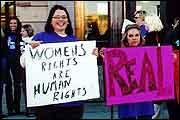South Dakota UUs fought state abortion ban
South Dakota's UUs are risking public censure and even harassment for protesting abortion ban.
Nor were the stories and efforts of many other women and men, a good number of them Unitarian Universalists, who drove for hours, walked the halls of the legislature, and protested on its steps time and again. On February 24 the legislature voted to ban nearly all abortions in the state and sent the measure to the governor who said he is inclined to sign it.
The measure directly targets Roe v. Wade, the 1973 U.S. Supreme Court decision that legalized abortion. South Dakota lawmakers believe the U.S. Supreme Court, with the addition of Justice Samuel Alito and Chief Justice John Roberts, is more likely to reverse Roe v. Wade.
“We’re all just in shock,” said Jan Snedigar, past president of the Black Hills Unitarian Universalist Fellowship in Rapid City. “We did all kinds of things to keep this from happening.” She herself was part of an interfaith group of 200 women who lobbied legislators in Pierre, the state capitol, in early February. “Our congregation was very active, but it wasn’t enough.”
Bach, also a member of the fellowship, testified at two legislative hearings. She shared her deeply personal story about being raped many years ago as an eighth-grader by a man in his 20s and about making the decision with the support of her mother, a doctor, and a counselor, to get an abortion. “I am so grateful abortion was legal and safe when I needed it,” she said in an interview last week.
“This issue has gone straight to the heart of many of us in South Dakota and can be difficult to talk about,” she said. “The legislators essentially said the rights of a fetus were more important than my life.”
Bach added that the state’s tiny band of UUs—there are only 186 adults and children in three congregations—was the only organized religious opposition to the bill, and that the great distances between communities in the state was a challenge. Driving to the state capital from Rapid City takes three to four hours each way, so attending a hearing or protesting meant taking a day off work.
“This has been a loving and welcoming community and family,” she said of her fellowship, “a safe place to share my story, a place of stability. When any of us get tired of this fight all we have to do is go to the fellowship on Sunday and we feel supported and rejuvenated and we know we can and must continue.”
Chas Jewett, chair of the 44-member fellowship’s social justice committee and a member of a statewide nonpartisan group, Democracy in Action, said anti-choice legislators put out a blitz of repressive bills in recent weeks. “We actually helped kill ten bills they tried to put through on issues against sex education and things like that,” said Jewett. “The one that got through was the abortion ban.”
“It’s very discouraging,” said Sue Ann Lang, president of All Souls Church Unitarian Universalist in Sioux Falls. With 70 members, it’s the largest UU congregation in South Dakota. “We have some very conservative legislators who think they represent the majority, but I think if it were put to a vote the people of the state would support abortion rights.”
Bach said she believes the legislature’s ban will finally move the people in South Dakota to action. “We didn’t believe it would go this far,” she said. “But people who have not been paying attention to politics are now stepping forward and saying, ‘What can we do?’ We truly believe a majority of South Dakotans do not want all abortions prohibited.”
UUs have a long history of supporting abortion rights. Delegates to the denomination’s General Assembly approved the first of eleven resolutions of support in 1963, 10 years before the Roe v. Wade decision; the most recent was in 2003. UUA President William G. Sinkford has spoken out for abortion rights and participated along with 2,000 other UUs in the April 2005 March for Women’s Lives in Washington, D.C.
Asked what UUs outside of South Dakota can do, Bach urged them to stay informed, vote, and run for office. “And they can write to us,” she said. “It’s important to us to feel their support.” (Congregational addresses can be found at www.uua.org/cong; see link in sidebar.)
Thelma Underberg, who attends All Souls, is executive director of NARAL ProChoice South Dakota. She predicted prochoice groups would challenge the bill because it has no exceptions for the health of women. She thinks it would take a minimum of two years for the challenge to reach the U.S. Supreme Court.
South Dakota’s experience should be a warning, she said, adding, “There are a lot of other terrible pieces of legislation out there. I hope people are finally waking up to the fact that things are totally out of whack.”
South Dakota has the fewest number of UUs of any state, but they are far from shy about speaking out on issues like abortion. They know, however, that when they do raise their voices in the public square there can be a price to pay. A year ago Justin Lena, a member of the Rapid City fellowship and chair of the local Democratic Party, wrote a letter to the newspaper advocating the availability of emergency contraception in hospital emergency rooms for women who are raped. The day the letter was published someone threw flaming liquid on his lawn.
“It’s not uncommon here for letter writers to receive anonymous threatening notes,” he said. “The fire was a little unnerving, but we just try to take these things in stride.”
See sidebar for links related to this story.








